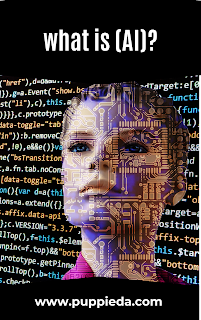

Have you ever heard about artificial intelligence, or AI? It’s a technology that’s rapidly changing our world, from the way we work and communicate to the very products we use every day. Artificial intelligence is no longer a futuristic concept; it’s a present reality impacting various sectors, and understanding its core principles is vital in today’s interconnected world. This article delves into the basics of artificial intelligence, exploring its applications, potential challenges, and future implications. We’ll uncover how AI is revolutionizing industries and shaping our daily lives, and address concerns around its impact on society. This comprehensive guide is structured to help you grasp AI’s multifaceted nature in a clear and concise manner.
Understanding Artificial Intelligence: A Basic Overview
Defining Artificial Intelligence
Artificial intelligence (AI) encompasses a broad range of techniques and algorithms that enable computers to mimic human cognitive functions. These functions include learning, problem-solving, decision-making, and even understanding natural language. Essentially, AI aims to create intelligent agents, systems that can reason, learn, and act autonomously. A crucial aspect of AI is its ability to adapt and improve its performance over time based on the data it processes. Consider AI as a powerful tool that can be applied to various tasks, from simple automation to complex problem-solving. For instance, AI is used in image recognition, natural language processing, and game playing. This article will provide a comprehensive overview of AI’s various aspects and applications, addressing the ethical concerns that often arise with such powerful technology.
Key Characteristics of AI
AI systems typically exhibit certain characteristics, including the ability to learn from data, adapt to new information, and reason logically. The ability of AI to analyze vast quantities of data is crucial for identifying patterns and trends that may not be obvious to humans. AI models can improve decision-making processes and optimize outcomes. These characteristics differentiate AI from traditional programming, which focuses primarily on predefined instructions. AI’s ability to learn and adapt makes it a powerful tool in various fields, enabling it to excel at tasks once thought solely within the realm of human capabilities.
The Diverse Applications of Artificial Intelligence
AI in Healthcare
AI is revolutionizing the healthcare industry through its ability to analyze medical images, predict patient outcomes, and assist in drug discovery. AI-powered diagnostic tools can help doctors detect diseases earlier and more accurately, improving patient outcomes and reducing healthcare costs. For example, AI algorithms can analyze medical images like X-rays and MRIs to detect anomalies, enabling faster and more accurate diagnoses. Similarly, AI can help identify potential risks and predict patient outcomes, allowing proactive interventions and personalized treatment plans. These advances are dramatically impacting the quality of healthcare provided, making AI a vital partner in this sector.
AI in Business
AI is transforming business operations, from customer service to supply chain management. AI-driven chatbots can handle customer inquiries, provide instant support, and offer personalized recommendations. AI algorithms are used to optimize inventory management, predict demand, and streamline supply chains. In the field of marketing, AI can analyze consumer data to understand buying patterns and personalize marketing campaigns, leading to increased efficiency and revenue generation.
Ethical Considerations and Future Implications of AI
The Ethical Implications of AI
As AI systems become more sophisticated, ethical concerns regarding bias, transparency, and accountability arise. AI systems can inherit biases present in the data they are trained on, potentially leading to discriminatory outcomes. Ensuring transparency in AI algorithms is crucial to understanding how decisions are made and to identify and mitigate potential biases. The development of accountable systems for AI is essential to address responsibility issues, particularly when AI systems are involved in high-stakes decisions. These are important factors to consider as we continue to integrate AI into various aspects of our lives. The ethical implications of AI need ongoing discussion and proactive measures to ensure responsible development and deployment.
Future Trends in AI
The future of AI is promising, with ongoing advancements in machine learning, deep learning, and natural language processing. New applications of AI are continually emerging across different sectors. Future trends suggest that AI will continue to play a critical role in solving complex problems and improving various aspects of our lives. Experts predict a rise in AI’s use in fields like personalized medicine, sustainable energy, and space exploration.
Challenges in Implementing AI Systems
Data Availability and Quality
AI algorithms rely heavily on data for training and operation. However, the availability of sufficient and high-quality data remains a significant challenge in some applications. Data collection, cleaning, and preparation can be time-consuming and costly. Furthermore, incomplete or inaccurate data can lead to biased or inaccurate results. Addressing these issues requires careful consideration and dedicated resources. For instance, the lack of sufficient data can limit the effectiveness of AI models in certain domains. This limitation emphasizes the importance of meticulous data handling practices.
The Importance of AI Integration
The seamless integration of AI systems into existing workflows and processes is vital for achieving optimal results. This integration requires careful planning and execution, considering potential disruptions and logistical challenges. Furthermore, fostering collaboration among different stakeholders, including developers, users, and regulatory bodies, is critical for successful integration and adoption.
The Impact of AI on Different Industries
AI in Finance
AI is transforming the financial industry, enhancing fraud detection, optimizing investment strategies, and providing personalized financial advice. AI-powered systems can identify fraudulent transactions in real-time, minimizing financial risks. Additionally, AI can assist in portfolio management and risk assessment, enabling more informed investment decisions. Ultimately, these advancements are likely to provide greater financial stability for users.
AI in Transportation
The automotive industry is leveraging AI to develop self-driving cars, optimize traffic flow, and enhance safety measures. Autonomous vehicles promise to revolutionize transportation, potentially leading to safer roads and more efficient logistics. The integration of AI into transportation systems has the potential to improve efficiency and enhance the overall experience. However, various challenges remain as we move forward in this field.
What are the potential risks and benefits of using AI?
AI systems, like any other technology, present both risks and benefits. Risks include the potential for bias, lack of transparency, and job displacement. Benefits encompass increased efficiency, productivity gains, and the ability to solve complex problems. Carefully assessing both the risks and benefits is essential for responsible AI development and implementation. A balanced approach is critical in ensuring the responsible use of this technology.
What is the future of AI?
The future of artificial intelligence is bright, and there is the potential for further advancements and integration into various sectors. Experts predict increased use in personalized healthcare, automated transportation, and sustainable energy solutions. However, ethical concerns and societal implications must be addressed to ensure that AI benefits all members of society.
How can I learn more about AI?
Several resources are available for learning more about AI, including online courses, books, and articles. Educational institutions and industry organizations also offer comprehensive programs and workshops. Exploring these resources can significantly improve your understanding of this transformative technology.
What ethical guidelines should be followed when using AI?
Ethical guidelines for AI development and deployment should prioritize transparency, fairness, accountability, and privacy. These guidelines are essential for mitigating potential harms and maximizing societal benefits. A commitment to responsible AI development and usage is crucial for safeguarding society and ensuring equitable outcomes.
Frequently Asked Questions about AI
What are the different types of AI?
Artificial intelligence is broadly categorized into several types, each with specific functionalities. These categories include reactive machines, limited memory AI, theory of mind AI, and self-aware AI. Reactive machines respond to immediate inputs, while limited memory AI can utilize past experiences. Theory of mind AI recognizes the mental states of others, and self-aware AI possesses self-awareness. Understanding these distinctions is crucial for developing and implementing appropriate AI systems.
In conclusion, artificial intelligence, or AI, is rapidly transforming our world, presenting both exciting opportunities and complex challenges. Understanding the fundamentals, diverse applications, and ethical considerations surrounding AI is crucial for navigating this evolving landscape. Embracing the potential of AI while proactively addressing its associated concerns will be key to harnessing its power responsibly and creating a positive future. Continue learning about AI by exploring further resources and engaging in discussions with experts in the field.